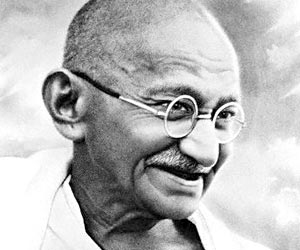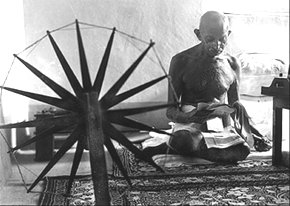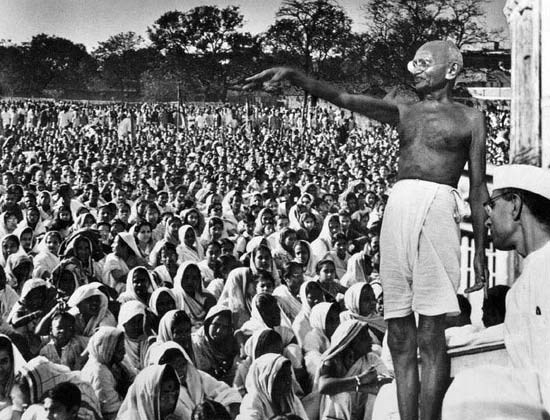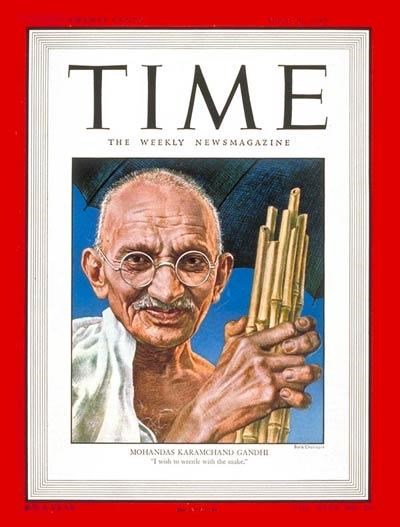 |
| Mahatma Gandhi (http://www.thefamouspeople.com/profiles/mahatma-gandhi-55.php) |
A great man once said: "You must be the change you wish to see in the world" and these words embodied the unfathomably unique mindset of one of the most revolutionary men in human history. This outstanding man was Mohandas Karamchand Gandhi, better known as Mahatma, which means great soul. Gandhi was born in India on October 2, 1869, in the town of Porbandar. Gandhi grew up with a fairly lavish lifestyle and at the age of 13 was married to 14 year old Kasturbai Makhanji. Although his early life and primary schooling was in India, he went to London when he was nearly 19 so he could study law. He fully accustomed himself to British customs and was excellent at English, politics, and leadership among other subjects. After several years of studying law, Gandhi went back to India for a brief two-year period and then relocated to South Africa where he would make a name for himself, financially, politically, and as a man with pioneering ideology. Gandhi started assisting people in South Africa, and then took his struggle for human rights to India. With his innovation, Gandhi became famous for his astounding intelligence and compassion which have helped him leave behind a perpetual legacy. His work has been forever revered by humanitarians. He was nominated for the Nobel Peace Prize five different times and was also considered for a posthumous award but controversially, in all these times never won (Tonnesson, Oyvind). Mohandas Karamchand Gandhi, in his valiant and revolutionary efforts in aiding the Indian people and other minorities, should have been awarded the Nobel Peace Prize.
"Gandhi, Mohandas." Gale Contextual Encyclopedia of World Literature. Vol. 2. Detroit: Gale, 2009. 664-667. Gale Virtual Reference Library. Web. 9 Dec. 2010.
"Gandhi, Mohandas Karamchand." Encyclopedia of Race and Racism. Ed. John Hartwell Moore. Vol. 2. Detroit: Macmillan Reference USA, 2008. 4-9. Gale Virtual Reference Library. Web. 13 Dec. 2010.
"I'm Inspired by Mahatma Gandhi, Says Obama - Express India." Express India - Latest News, India News, Indian Cricket, World, Entertainment, Business & Finance News. 23 Feb. 2008. Web. 04 Jan. 2011. <http://www.expressindia.com/latest-news/Im-inspired-by-Mahatma-Gandhi-says-Obama/276346/>.
"Mohandas Karamchand Gandhi." Encyclopedia of World Biography. 2nd ed. Vol. 6. Detroit: Gale, 2004. 201-204. Gale Virtual Reference Library. Web. 13 Dec. 2010.
Rosenberg, Jennifer. "Gandhi - Biography of Mahatma Gandhi." 20th Century History. Web. 06 Jan. 2011. <http://history1900s.about.com/od/people/a/gandhi.htm>.
Tonnesson, Oyvind. "Mahatma Gandhi, the Missing Laureate." Nobelprize.org. Web. 14 Dec. 2010.
 |
| Gandhi (http://www.indianchild.com/mahatma_gandhi.htm) |
Mohandas Gandhi was a force against injustice, as he used his advanced intellect and deep compassion to labor for the minorities of South Africa to receive justice from the British Government. He was not born a force against prejudice, but rather became one through an unfortunate incident: When in South Africa, Gandhi attained his desire for racial equality when he attempted to travel first class in a train, but the white men aboard the train would not let him on board first class, although he held a ticket. Since Gandhi would not succumb to unfairness he refused to leave first class and the white men eventually consulted authorities and threw him off the train. Gandhi pondered if he should go home to India or try to remedy the unfair racial state of affairs (Rosenberg). This experience changed Gandhi and made him strive to relieve the world of racial discrimination. At a young age, he experienced unfairness; however Gandhi responded not with bitterness but rather with determination to make sure the cruelty he received was not experienced by other people. Gandhi firmly believed all people had the right to be treated equally: "Gandhi's innovative melding of political, social, and religious thinking led him to the key concept of satyagraha, or nonviolent resistance to illegitimate authority. He launched a mass civil disobedience campaign in Johannesburg in 1906 to protest the Transvaal government's plan to register and better police the Indian population, and he continued to promote satyagraha until he returned to India eight years later. While Gandhi's efforts to improve the plight of South African Indians produced few concrete gains, they did help bolster Indian confidence and self-esteem. Gandhi's endeavors also encouraged South Africa's oppressed black majority in its struggle for political and civil rights" (Gandhi, Mohandas). Satyagraha was essentially Gandhi’s name for his nonviolent methods that defined his success. Gandhi, a humanitarian felt the need to rectify the situation in South Africa to make it fair for all people of all colors and religions. He was not made biased by his British education and as a human felt emotionally obliged to do the right thing and to help people in need. Gandhi felt the South African society needed to change: "In 1908, however, he envisioned a day when "all the different races [of South Africa] commingle and produce a civilization that perhaps the world has not yet seen". That year Jan Smuts, a future prime minister of South Africa, warned that the Indian defiance initiated by Gandhi could lead one day to African defiance, a possibility Gandhi recognized and welcomed" (Gandhi, Mohandas Karamchand). Gandhi saw the mistreatment of South African minorities, and thought with all fairness in mind that racial discrimination should be abolished. He was ready and willing to fight for whatever was necessary in order to achieve a noble goal that would promote peace and well being among the less fortunate. Gandhi used his superior knowledge and compassion to help the minorities of South Africa because he felt that the British Government was unjust.
 |
| Gandhi addressing the people of India (http://www.ndstrupler.com/wp-content/uploads/gandhi-india.jpg) |
Mohandas Karamchand Gandhi was a revolutionary leader who essentially freed India from British rule with valiance; he had the courage to stand up against authorities in a respectful but tactical way. Gandhi was firm in his morals and beliefs and was not one to be shaken: "Gandhi also developed the protest march. A British law taxed all salt used by Indians, a severe hardship on the peasant. In 1930 Gandhi began a famous 24-day "salt march" to the sea. Several thousand marchers walked 241 miles to the coast, where Gandhi picked up a handful of salt in defiance of the government. This signaled a nationwide movement in which peasants produced salt illegally and Congress volunteers sold contraband salt in the cities. Nationalists gained faith that they could shrug off foreign rule. The march also made the British more aware that they were subjugating India" (Mohandas Karamchand Gandhi). He bravely confronted the British and protested amongst his fellow Indian supporters to prove that he was a force to be reckoned with. Even though he was arrested, Gandhi proudly stood in defiance to promote his beliefs and continued his movement that eventually changed the laws and reversed the unfair taxation. Gandhi did not allow the British to belittle or condescend onto the newly forming rebellion movement in India: "The British continued to exclude the Indians from the process of political reform and administration of India. Frustrated with the slow pace of reforms, Gandhi reentered the political arena in 1928, urging Congress to launch another nationwide strike unless India's demands for constitutional independence were met within a year. The British did not meet these demands. In consequence, Gandhi organized a symbolic demonstration of the Indians' refusal to recognize the British government's authority" (Gandhi, Mohandas). Courageously, Gandhi was building power in a strong political way that made him a dominant leader and wise director in the fight for political reform. His honorable acts of defiance and tactical protesting lead to a stronger Indian government that was more interested in the people's ideals rather than the ideals of a mere colony. Innovative and cunning, Gandhi was successfully able to strategically battle the oppressing power of the British in a ground-breaking and powerful campaign.
 |
| Gandhi on Time Magazine (http://nyclovesnyc.blogspot.com/2010/04/mohandas-ghandi-sculpture-in-union.html) |
With his unmatchable legacy, Mahatma Gandhi inspired countless significant people to arise and become leading human rights activists against injustice and discrimination. President Barack Obama considers Gandhi as an incredible positive influence: "In my life, I have always looked to Mahatma Gandhi as an inspiration, because he embodies the kind of transformational change that can be made when ordinary people come together to do extraordinary things" (I'm Inspired by Mahatma Gandhi). The fact that President Barack Obama, a Nobel Peace Prize nominee and recipient said this about Gandhi shows the obvious memory Gandhi has impressed upon the world. Obama's recognition of Gandhi's accolades and achievements many decades after Gandhi had accomplished them illustrates Mahatma's humanitarian work is perennial and will be revered for infinite years to come. Throughout history, immeasurable amounts of other incredibly noteworthy people have recognized, cited, and admired Gandhi: "In the 1960s, Martin Luther King Jr. would acknowledge the debt he and the American civil rights movement owed to Gandhi, and there have been similar expressions from Cesar Chavez (1927-1993), the North American farmworkers' leader; from Abdul Ghaffar Khan (1890-1988), who in the 1930s raised a nonviolent army of Pashtuns not far from the Afghan-Pakistan border; from Benigno Aquino (1932-1983), the chief opponent of Marcos's military regime in the Philippines; from His Holiness the Dalai Lama of Tibet (1935-) and others" (Gandhi, Mohandas Karamchand). Martin Luther King Jr. among others is the foremost example of a man with a mission to improve the world because he sees a vital flaw, and he is no doubt highly inspired by Gandhi and used a myriad of Gandhi's fundamental techniques. Gandhi’s characteristics, qualities, and actions have fueled the thought processes of many other famous nonviolent activists. His words have impacted the millions of people who were victims of injustice, and they have helped leaders like Cesar Chavez to patriotically step forward from the rest of society as a person who struggles against the world to achieve the right thing. Gandhi lived his life in an exemplary way that left a legacy and an impression upon the world to follow in his footsteps to make a more just world where everyone is treated fairly, and his actions and words have benefitted many generations after him and will benefit many generations to come.
Courageous and bold, Gandhi used inventive tactics to support the numerous mistreated minorities of South Africa and India and furthermore left a lasting memory of peace. Gandhi possessed remarkable characteristics that allowed him to rise above the typical and fight the unfair status quo. His courage and gallantry combined with his cleverness and ingeniousness made him a sure nominee for the Nobel Peace Prize. Yet in an unfathomable twist of fate, the man who deserved the Prize more than others did not receive the prize. To this day, one of our most celebrated figures in the field of peace is without the award he ought to have. Gandhi is recognized as an inspiration to various noteworthy people like Nelson Mandela and Desmond Tutu and is idolized by countless average people. Gandhi is admired by the Indian people as the Father of the Nation, and several shrines and statues have been built for him as well as temples. His can-do attitude and perseverance make him an honorable legend that I look up to. Mohandas Gandhi said: "You must be the change you wish to see in the world" and rightfully so, because Gandhi was a man who truly lived so that he was the change he wished to see in the world.
Page created on 1/16/2011 12:00:00 AM
Last edited 1/3/2019 11:20:09 PM
